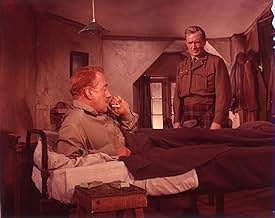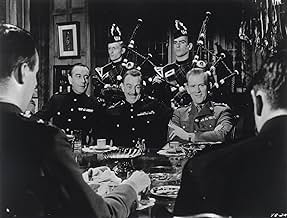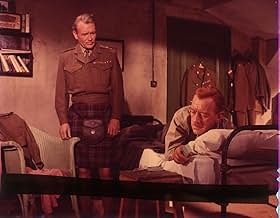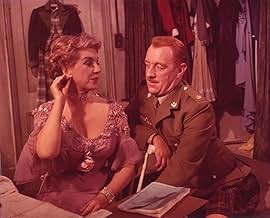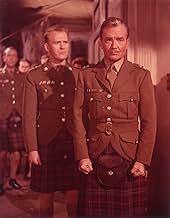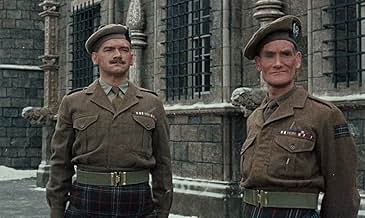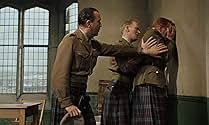IMDb RATING
7.5/10
4.9K
YOUR RATING
After World War II, a Highland Regiment's acting Commanding Officer, who rose from the ranks, is replaced by a peace-time Oxford-educated Commanding Officer, leading to a dramatic conflict b... Read allAfter World War II, a Highland Regiment's acting Commanding Officer, who rose from the ranks, is replaced by a peace-time Oxford-educated Commanding Officer, leading to a dramatic conflict between the two.After World War II, a Highland Regiment's acting Commanding Officer, who rose from the ranks, is replaced by a peace-time Oxford-educated Commanding Officer, leading to a dramatic conflict between the two.
- Nominated for 1 Oscar
- 2 wins & 7 nominations total
Featured reviews
You will never know whether you should love or hate the two lead male actors this this movie. Just when you find yourself hating the Guiness character, you will be pulled in the opposite direction, and find yourself feeling sad for him. Same for everyone really in this story which is what makes it so engaging. The rich and privileged John Mills is easy to hate as he didn't have to work hard to get where he is. But that very stigma is what hurts him, as he is never really given a chance to be seen as anything more than a privileged fool, so then you pity him. Guiness plays a character who worked very hard for everything he has, and is to be admired until you realize he doesn't give any room for kindness, or compassion, and then you pity him too, but for different reasons. I saw this movie at 3:00 am on a work night, and couldn't move from the screen, despite my early day at work. I was pulled into this story that seemed too familar to me as we are all guilty of either judgement. Brilliant.
10jhclues
A clash of wills and personalities between two men, one a psychologically scarred idealist, the other driven by ego and his own needs to the point of cruelty, is examined in the peacetime military drama, `Tunes of Glory,' directed by Ronald Neame and starring Alec Guinness and John Mills. Major Jock Sinclair (Guinness) is the acting Colonel of a Scottish regiment, but as the story begins he has been notified that he has been passed over for promotion and his replacement, Lieutenant Colonel Basil Barrow (Mills) is en route to take command. Sinclair is a soldier's soldier, a man's man loved and respected (with some qualifications) by his men. He has clawed his way up through the ranks, was once a piper (he would've been happy as a Pipe Major, in fact, but Hitler-- as he says at one point-- `Changed all that'), and feels strongly that he should have been made Colonel of the regiment. Barrow, on the other hand, is an aristocrat and a third generation officer of this particular regiment. He suffers, however, from his experience in a prisoner-of-war camp, and has never fully recovered, the impact of which is succinctly expressed when he tells his Captain that he never really came back. From the beginning, it's an almost impossible situation, and from the moment Barrows arrives the atmosphere is thick with tension as he and Sinclair square off in a contest from which it is readily evident that neither will emerge unscathed in one way or another .
Working from a tight, intelligent screenplay by James Kennaway (adapted from his own novel), Neame delivers a taut, insightful character driven drama that explores the diversity of human nature, and illustrates the good and evil contained within us all and the traits which ultimately determine which will be the prevalent manifestation of the individual personality. Through the device of placing the protagonist and the antagonist-- each the antithesis of the other-- in a no-win situation, the film examines motivations, actions and reactions that can lead the story in any number of directions, none of which are positive, but all of which are logical and which finally leads to a conclusion that is extremely powerful, incisive and totally believable.
As Jock Sinclair, you see Alec Guinness in a role quite unlike anything else he's ever done; it was, in fact, his own personal favorite of all of his cinematic creations. Sinclair is a man who is course and rough-hewn, an egoist who, when the personal need arises, will wantonly subject those around him to psychological cruelty in order to elevate himself and his position and to assuage his own ego. At mess, for example, he derides a young officer for not smoking his cigarette like a man; he orders every `man' to drink whiskey, implying that to do otherwise constitutes an assessment of an individual's masculinity. Boisterous bravura and ribald behavior are his tools of navigation through life, coupled with an attitude of doing things his way or the wrong way. And Guinness plays it to the hilts. Beginning with his whole perspective and attitude, he IS Sinclair, while physically he embodies and expresses exactly who this man is and what he stands for. At times, his eyes fairly bulge with an enthusiasm that suggests a lasciviousness underlying the cruelty; when he walks he strides purposefully, and carries himself in such a way that when he enters a room he veritably fills it and makes his presence felt so that the very air seems oppressed by him. It's a performance that, even in a strong year of Oscar contenders (Trevor Howard, Lancaster, Lemmon, Olivier and Tracy were all up for Best Actor-- Lancaster won) he deserved to be among them. In this film Guinness is quite simply unforgettable in one of his most powerful roles.
John Mills, as well, delivers a superb, introspective performance as Barrow, capturing the way in which this man must live so inwardly to survive, and conveying how difficult it is for him to continue on while attempting to live up to his heritage and the expectations of a position to which he is clearly unfit in his current mental state. In Barrow we see reflected the prevailing attitude of the times that `might makes right,' and that anything less is akin to unacceptable negligence, that same military mind-set that put Jake Holman at odds with the world in `The Sand Pebbles,' and led to the unfortunate incident depicted so eloquently in `A Few Good Men.' It's an excellent, understated, sensitive performance by Mills, who plays brilliantly off of Guinness's brutishness.
The film also boasts a number of excellent supporting performances, especially Dennis Price, as Major Charlie Scott, whose stoic assessment of himself as well as the situation at hand serves as the film's conscience; Gordon Jackson as the sympathetic Captain Jimmy Cairns; and Duncan Macrae in a memorable turn as Pipe Major Duncan MacLean.
Also included in this outstanding supporting cast are Kay Walsh (Mary), John Fraser (Ian), Susannah York (In her film debut as Morag Sinclair), Percy Herbert (Riddick), Allan Cuthbertson (Eric) and Angus Lennie (Orderly). A powerful film that so successfully demonstrates the devastating effects of dysfunctional human relationships and conveys the need to look beyond ourselves, `Tunes of Glory' presents a story to which everyone will be able to relate because the theme is applicable to any setting involving human interactions. A thoroughly involving film featuring a number of memorable performances (especially by Guinness) that will give you reason to take pause and reflect, and hopefully add some perspective to a world too often mired in unnecessary turmoil. I rate this one 10/10.
Working from a tight, intelligent screenplay by James Kennaway (adapted from his own novel), Neame delivers a taut, insightful character driven drama that explores the diversity of human nature, and illustrates the good and evil contained within us all and the traits which ultimately determine which will be the prevalent manifestation of the individual personality. Through the device of placing the protagonist and the antagonist-- each the antithesis of the other-- in a no-win situation, the film examines motivations, actions and reactions that can lead the story in any number of directions, none of which are positive, but all of which are logical and which finally leads to a conclusion that is extremely powerful, incisive and totally believable.
As Jock Sinclair, you see Alec Guinness in a role quite unlike anything else he's ever done; it was, in fact, his own personal favorite of all of his cinematic creations. Sinclair is a man who is course and rough-hewn, an egoist who, when the personal need arises, will wantonly subject those around him to psychological cruelty in order to elevate himself and his position and to assuage his own ego. At mess, for example, he derides a young officer for not smoking his cigarette like a man; he orders every `man' to drink whiskey, implying that to do otherwise constitutes an assessment of an individual's masculinity. Boisterous bravura and ribald behavior are his tools of navigation through life, coupled with an attitude of doing things his way or the wrong way. And Guinness plays it to the hilts. Beginning with his whole perspective and attitude, he IS Sinclair, while physically he embodies and expresses exactly who this man is and what he stands for. At times, his eyes fairly bulge with an enthusiasm that suggests a lasciviousness underlying the cruelty; when he walks he strides purposefully, and carries himself in such a way that when he enters a room he veritably fills it and makes his presence felt so that the very air seems oppressed by him. It's a performance that, even in a strong year of Oscar contenders (Trevor Howard, Lancaster, Lemmon, Olivier and Tracy were all up for Best Actor-- Lancaster won) he deserved to be among them. In this film Guinness is quite simply unforgettable in one of his most powerful roles.
John Mills, as well, delivers a superb, introspective performance as Barrow, capturing the way in which this man must live so inwardly to survive, and conveying how difficult it is for him to continue on while attempting to live up to his heritage and the expectations of a position to which he is clearly unfit in his current mental state. In Barrow we see reflected the prevailing attitude of the times that `might makes right,' and that anything less is akin to unacceptable negligence, that same military mind-set that put Jake Holman at odds with the world in `The Sand Pebbles,' and led to the unfortunate incident depicted so eloquently in `A Few Good Men.' It's an excellent, understated, sensitive performance by Mills, who plays brilliantly off of Guinness's brutishness.
The film also boasts a number of excellent supporting performances, especially Dennis Price, as Major Charlie Scott, whose stoic assessment of himself as well as the situation at hand serves as the film's conscience; Gordon Jackson as the sympathetic Captain Jimmy Cairns; and Duncan Macrae in a memorable turn as Pipe Major Duncan MacLean.
Also included in this outstanding supporting cast are Kay Walsh (Mary), John Fraser (Ian), Susannah York (In her film debut as Morag Sinclair), Percy Herbert (Riddick), Allan Cuthbertson (Eric) and Angus Lennie (Orderly). A powerful film that so successfully demonstrates the devastating effects of dysfunctional human relationships and conveys the need to look beyond ourselves, `Tunes of Glory' presents a story to which everyone will be able to relate because the theme is applicable to any setting involving human interactions. A thoroughly involving film featuring a number of memorable performances (especially by Guinness) that will give you reason to take pause and reflect, and hopefully add some perspective to a world too often mired in unnecessary turmoil. I rate this one 10/10.
Alec Guinness is superb as acting colonel Jock Sinclair. Drunken and boorish, a terrible administrator but a wartime hero. Rough and wild for once, he is cast against type, yet emerges triumphant in an acting master class.
The book is a slim volume, but is fast moving and full of character. Set in provincial Scotland, the flavour of the film is as strong as the novel (by James Kennaway who also wrote the screenplay) but the characterisation by the actors builds on and then surpasses the script. I note that neither of the actors is Scottish and this amazes me. Maybe I should seek advice from a Scot on this matter.
We never leave the barracks or the quiet army town and so learn only by rumour how Jock Sinclair, on some blasted field at the centre of El Alamein saved his regiment and turned the battle. Half the officers and men were dead, the cause lost, yet his spirit and the force of his will brought him a battlefield promotion to acting colonel. The Regiment is what he lives for.
Several years later, in peacetime, the army catches up with its paperwork and sends a proper officer to take back the reins. Basil Barrow arrives unexpectedly from a desk job and Sandhurst. His assignment is to organise and civilise the men, long gone wild under Jock's supervision. John Mills plays the rather impotent lonely Barrow as an accentless and educated man. There are "dark rumours" amongst the men that he may be English.
The clash between the two men commences immediately on their meeting and ends in scenes of mourning and redemption.
This is an actors film. There are few effects and much of the action is centred on one or the other of Guinness or Mills. Sinclair is a piper, this gives him an almost spiritual air and his feel for music (the Tunes of Glory) is the first area of contention between the two Colonels. When Jock leads his men in a wild and unruly reel with arms flailing and much shouting and yipping at a society ball the ensuing fit from the uptight and conservative Mills is wonderful. He trembles and shakes and we do likewise.
The film builds and builds to a finale full of Tunes of Glory and we come to an understanding about both men, as they come to understand each other.
The book is a slim volume, but is fast moving and full of character. Set in provincial Scotland, the flavour of the film is as strong as the novel (by James Kennaway who also wrote the screenplay) but the characterisation by the actors builds on and then surpasses the script. I note that neither of the actors is Scottish and this amazes me. Maybe I should seek advice from a Scot on this matter.
We never leave the barracks or the quiet army town and so learn only by rumour how Jock Sinclair, on some blasted field at the centre of El Alamein saved his regiment and turned the battle. Half the officers and men were dead, the cause lost, yet his spirit and the force of his will brought him a battlefield promotion to acting colonel. The Regiment is what he lives for.
Several years later, in peacetime, the army catches up with its paperwork and sends a proper officer to take back the reins. Basil Barrow arrives unexpectedly from a desk job and Sandhurst. His assignment is to organise and civilise the men, long gone wild under Jock's supervision. John Mills plays the rather impotent lonely Barrow as an accentless and educated man. There are "dark rumours" amongst the men that he may be English.
The clash between the two men commences immediately on their meeting and ends in scenes of mourning and redemption.
This is an actors film. There are few effects and much of the action is centred on one or the other of Guinness or Mills. Sinclair is a piper, this gives him an almost spiritual air and his feel for music (the Tunes of Glory) is the first area of contention between the two Colonels. When Jock leads his men in a wild and unruly reel with arms flailing and much shouting and yipping at a society ball the ensuing fit from the uptight and conservative Mills is wonderful. He trembles and shakes and we do likewise.
The film builds and builds to a finale full of Tunes of Glory and we come to an understanding about both men, as they come to understand each other.
One of the marks of a truly great actor is the ability to do both comedy and heavy roles. To contrast Guinness's portrayal here of Jock Sinclair with, say, his Professor Marcus in 'The Ladykillers' is to become aware of the protean range of his talent. (One cannot imagine, for instance, John Wayne doing comedy.) To my mind Alec Guinness is the premier actor of the century; his performances have immeasurably enriched my inner life.
I am not as enamored of "Tunes of Glory" as I am of, say, "Bridge on the River Kwai," but it is without question a powerful movie. The conflict between Sinclair and Barrow is palpable; I think, in particular, of Mill's violently trembling rage during the dancing scene, and Guinness's dismissive ridicule of Barrow's deepest confidences ("toy soldiers!") during his attempt to con him into clemency. Sinclair's grief-stricken collapse at the end is truly an unforgettable scene and a tribute to Guinness's power.
I am not as enamored of "Tunes of Glory" as I am of, say, "Bridge on the River Kwai," but it is without question a powerful movie. The conflict between Sinclair and Barrow is palpable; I think, in particular, of Mill's violently trembling rage during the dancing scene, and Guinness's dismissive ridicule of Barrow's deepest confidences ("toy soldiers!") during his attempt to con him into clemency. Sinclair's grief-stricken collapse at the end is truly an unforgettable scene and a tribute to Guinness's power.
British military drama starring Alec Guinness as Maj. Sinclair, the loud, boisterous commanding officer of a Scottish regiment in the years after WWII. Higher ups decide that Sinclair isn't an appropriate peacetime commander, so they send Col. Barrow (John Mills) to replace him. Barrow is a strict ruler-follower who likes life quiet, sober, and "respectable". This sets the stage for a battle of wills between the two officers.
I've heard of this movie for a long time, and knew that it was well-liked (Guinness considered it one of his best performances), but it wasn't what I was expecting. It's a psychological study of these two men, and, with the Barrow character, an early examination of PTSD before it was called that (he was a P. O. W. In a Japanese camp, and was tortured). The accents can be a bit much, and if you don't like bagpipes, this is definitely not the movie for you, but I thought the acting was terrific, and the slow-burn drama builds to a shattering conclusion.
I've heard of this movie for a long time, and knew that it was well-liked (Guinness considered it one of his best performances), but it wasn't what I was expecting. It's a psychological study of these two men, and, with the Barrow character, an early examination of PTSD before it was called that (he was a P. O. W. In a Japanese camp, and was tortured). The accents can be a bit much, and if you don't like bagpipes, this is definitely not the movie for you, but I thought the acting was terrific, and the slow-burn drama builds to a shattering conclusion.
Did you know
- TriviaSir Alec Guinness was offered the role of Lieutenant Colonel Barrow, but asked for the role of Major Sinclair instead. He then suggested Sir John Mills for the other role.
- GoofsPipe Major MacLean is never shown with a set of bagpipes. In particular, he is a mere observer at band practice. A pipe major is not only the leader of the band but also its chief instructor, and it is unthinkable that he would not play an active role in all practices.
- Quotes
Major Jock Sinclair, D.S.O., M.M.: We're on a first name basis in this regiment. Your first name is Derek. My first name is Major.
- ConnectionsFeatured in Film Extra: Alec Guiness (1973)
- How long is Tunes of Glory?Powered by Alexa
Details
- Runtime1 hour 47 minutes
- Color
- Aspect ratio
- 1.66 : 1
Contribute to this page
Suggest an edit or add missing content

Top Gap
By what name was Les fanfares de la gloire (1960) officially released in India in English?
Answer

